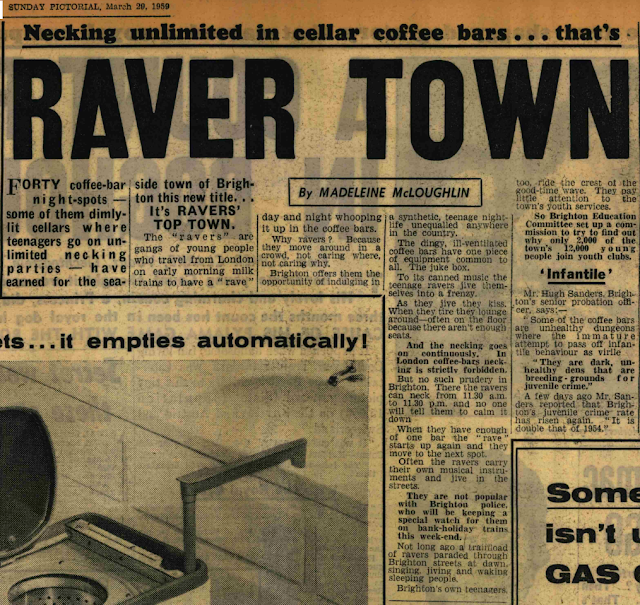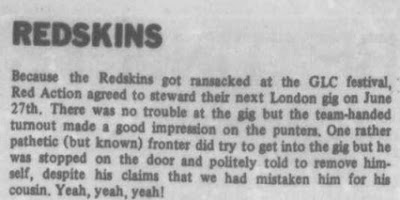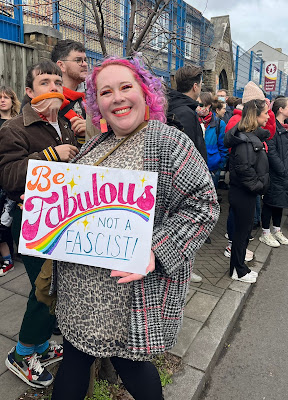Saturday, April 29, 2023
'It's Ravers' top town': Brighton 1959
Tuesday, April 25, 2023
'Time for Peace, Time to Go': demonstrations in London, Belfast and Dublin - August 1994
1994 marked the 25th anniversary of British troops being sent on to the streets of the north of Ireland, and there were demonstrations in London, Belfast, and Dublin on the theme of '25 years - time to go, time for peace'.
London, 13 August 1994
In London the Troops Out Movement and other groups including the Irish in Britain Representation Group held a march from the park by the Imperial War Museum. Black balloons were released to mark the dead of the conflict and a coffin taken to Downing Street labelled 'Britain's War: 25 years - 3400 dead'. Around 3,000 people took part.
 |
| A sticker for the demo |
 |
| Black balloons released over Westminster |
 |
| 'Troops Out' magazine, August/September 1994 |
In Belfast the next day there was another demonstration, with thousands of people converging on City Hall in parades from all parts of the city. The largest contingent came from West Belfast, where 'The march proceeded to the Whiterock Road where the Ballymurphy section of the march joined them. Several of the visiting delegations were with this section of the march. There were contingents from Noraid, from the Basque country, from Italy as well from the Troops Out Movement and many other solidarity groups' (An Phoblact, 18 August 1994). Speakers at the end of the march included Sinn Fein president Gerry Adams.
 |
| 'Falls/Clonard: 25 years of resistance' - mural in Dunville Street off the Falls Road in Belfast |
 |
| 'Cheering marchers say Britain Must Go', An Phoblact, 18 August 1994 |
 |
| The Angel of Death leads the march |
 |
| 'Get out of my sight!' |
 |
| A float highlighting Fermanagh/Monaghan border posts |
 |
| 'Guth na mBan' singing 'Something inside so strong' |
 |
| The Dublin and Monaghan bombs in 1974 killed 33 people and were planted by the Ulster Volunteer Force with the knowledge of British intelligence |
 |
| At the GPO |
 |
 |
| 'Slán abhaile' (Safe Home) |
 |
| A summary of other Time to Go events including in Derry, Crossmaglen, Newry and around the world (An Phoblact, 18 August 1994) |
 |
| 'Time for Peace, Time to Go' (I did think this photo might have been from Dublin, but seems it's actually Albert Square in Manchester, so this must have been on the Bloody Sunday demo there in January 1995) |
Sunday, April 23, 2023
Birdsong, Sonic Diversity and Extinction Rebellion
There were the usual demonstration noises of chanting, samba bands, not to mention morris dancers and a guy playing the bagpipes. But throughout people were also playing amplified birdsong, sometimes loud enough for me to look round expecting to see a swift or other bird. This may sound a bit twee(t), but it actually addresses the threat of a fundamental change in our species being.
The decline in the number of birds is not a hypothetical future catastrophe but something that has been happening for years and this is shaping our lives as well as theirs. I recently read Steven Lovatt's 'Birdsong in a time of silence' (2021) which makes the point that 'we've grown up with birdsong, both individually and as a species. It has always been there, and it's part of our feeling of belonging to the world. And since sounds produce chemical effects within our bodies of stress or pleasure, it's more than figuratively true to say that we have birdsong in the blood'.
 |
| 'No system but the ecosystem' |
In Donna Harraway's terms we need to nurture our kinship with such 'companion species' and shape the 'conditions for multispecies flourishing' (Staying with the Trouble: Making Kin in the Chthulucene, 2016). But the opposite is happening. David George Haskell highlights birdsong as part of the ‘world’s acoustic riches’ which are under threat. ‘Habit destruction and human noise are erasing sonic diversity worldwide’ and feeding a 'crisis of sensory extinction'. As a consequence ‘The vitality of the world depends, in part, on whether we turn our ears back to the living Earth. To listen, then, is a delight, a window into life’s creativity and a political and moral act’ (Sounds Wild and Broken: Sonic Marvels, Evolution's Creativity, and the Crisis of Sensory Extinction, 2022).
 |
| 'No borders in climate justice' |

 |
| 'Doggedly pursuing climate justice' |
Wednesday, April 19, 2023
Annotated Archives at 56a Infoshop
 |
| Post lockdown party at 56a in July 2021 to celebrate its 30th birthday |
Monday, April 03, 2023
The Redskins - revolutionary rock'n'roll?
Friday, March 31, 2023
In defence of Billy Bragg and Trans Rights
Billy Bragg has fluctuated in my estimation over the years. When he first appeared on the scene, singing solo on electric guitar was more or less unknown and he had some great songs. I mean a double A side single of New England and St Swithins Day in 1984... few can top that. Levi Stubbs Tears can still make me cry.
And yes he was on the right (left) side of the all the big battles like the miners strike. My main criticism of him in those days from my anarcho/ultraleft stance was that he was so close to the Labour Party. Must confess I may even have heckled him from this perspective when he played on a National Union of Students demo though he was great live (sorry Billy)! I've never been entirely convinced by his 'progressive patriotism' line of reclaiming icons of English identity from the far right, though I can see that it can sometimes be effective.
Still he has stuck to his guns politically when others have gone quiet, not to mention later nameless indie folk singers influenced by him who must be suspected of being shy Tories given their absence of anything to say. He has played countless benefit gigs for various worthy causes.
Musically he has steered an interesting path for someone from a punk background - I actually have a copy of his 1978 punk single with his band Riff Raff, 'I wanna be a cosmonaut', which I sometimes played as part of my Disconaut Autonomous Astronauts set. He has explored Americana through his interpretations of Woody Guthrie lyrics with Wilco, and English folk music with Imagined Village.
I might add that my partner is from Dagenham and no word can be spoken against him in our house.
 |
| Billy Bragg singing outside the Festival Hall, June 2007 |
But recently my social media timelines have been flooded with accusations about Bragg accusing him of misogyny and being anti-women. The reason for this attention is that he has been an outspoken supporter of trans rights, including changing the words of songs to be trans-inclusive. He now sings his old song 'Sexuality' with the lyrics “And just because you're they, I won't turn you away' instead of 'just because you're gay', explaining 'Times changed. Anyone born since the song was released would wonder why it’s a big deal to find common ground with a gay man. The front line now is trans rights'. Bragg has also been critical of those feminists who oppose trans rights along with their far right allies. But if Bragg is a misogynist then so presumably are the Feminist Library, Sisters Uncut, Gal-Dem etc. and many other feminist projects - not to mention most left wing/anarcho/radical folks under the age of 35.
I think Bragg is braver than most because he actually stands to lose some of his livelihood for speaking out. I hate the lazy political stereotyping of generations, but I do feel there is a generational aspect at play here. The trans exclusionary position does seem to be particularly concentrated among British lefties of a certain age. I would estimate that the majority of people I know who were involved in radical politics in the 1980s have this as a default setting. This is precisely the constituency who are Bragg's natural fan base and it would be very easy for him to just serve them up 'what did you do in the strike?' platitudes rather than challenge their current day prejudices.
And I don't feel that prejudice is too strong a word. For me the issue does come down to the simple one of 'Some people are trans, get over it'. We can debate biology, gender and ideology until the cows come home, but it is a fact that some people really do experience gender dysphoria and that their lives can be made better by having their gender identity recognised. It seems needlessly cruel to deny this, or to portray those in this position as some terrible threat. Of course that's a simple version of the argument and there's much more that I could say, but that has to be the starting point.
There are some comparisons here with what happened when the Gay Liberation Front and similar groups erupted in the 1970s. Then too there were plenty of older (and some younger) leftists who found this threatening and denounced them, didn't they know that homosexuality would disappear under socialism and anyway wasn't all this a diversion from the class struggle? (see for instance this Gay Left article on the experience in the International Socialists). Let's just say that history has not been kind...
I know change and challenges to accepted ideas are uncomfortable. I would just urge people to pause and sit with this discomfort for a while rather than make knee jerk responses to something they mostly don't know much about. Read some books, listen to some trans people. People also need to look around at the company they are keeping. Globally the anti-trans movement is being driven by the far right who are also coming for abortion rights and LGBTQ+ people generally. As someone once said 'If you board the wrong train, it is no use running along the corridor in the other direction' (attributed to Dietrich Bonhoeffer). Wouldn't you rather be heading along the A13 with Billy Bragg?
[sometimes it's a lonely and painful path when you feel so many of your friends have taken a wrong turn. Anyone for a support group for 'Boomers and Gen Xers for trans rights'?]
by Neil Transpontine, written on transgender day of visibility 2023
(had some positive responses to this post including one friend saying 'I think us boomers / gen x for trans rights ARE the majority - it’s just the usual crap about those shouting loudest')
Update 31 March 2024
Nothing much has changed, though I've noticed a few left anti-trans people nervously trying to distance themselves from the openly far right associations of some of the people they previously defended (but see Bonhoeffer quote above). A 'wait, are we the baddies?' moment can't come too soon, but I don't think it's good enough. The most sustained anti-fascist movement in London in the past 12 months was at the Honor Oak pub in South London from February to August 2023 where for six months people turned up to oppose openly far right protestors targeting a drag storytelling event. The anti-fascist effort was led by trans/queer activists - see 'South London Loves Trans People' banner below. Being an anti-fascist today means standing alongside and in solidarity with trans people.
For more on the Honor Oak movement, see my article in Datacide magazine: Defending Drag - South London is Still Anti-Fascist































.JPG)